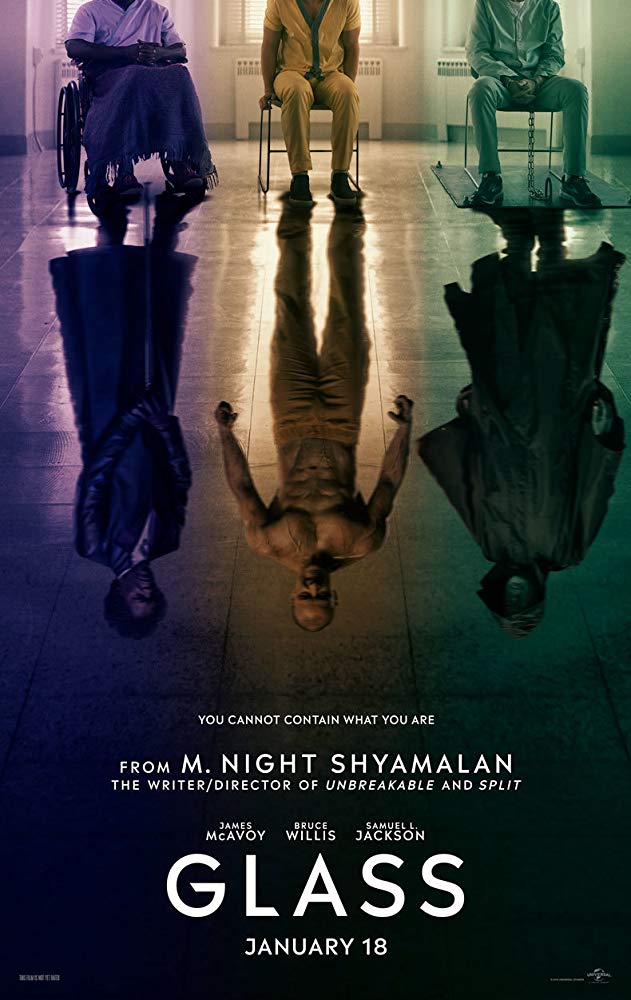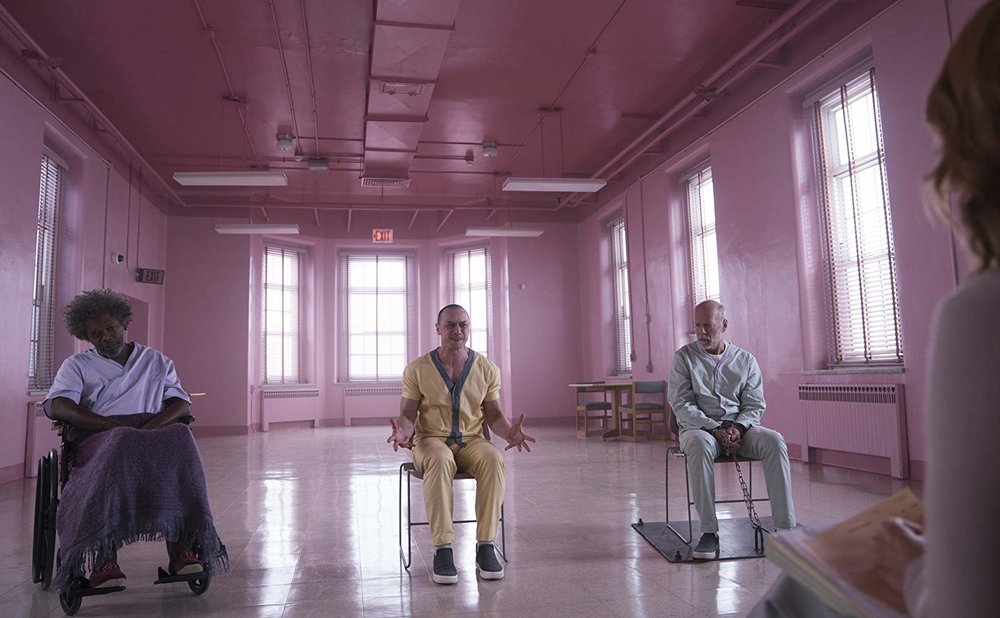Glass (2019)


SHOULD I SEE IT?
YES
So many people are amped up for Glass, the sequel to not only 2017’s Split but also 2000’s Unbreakable. I get it, I do. I was feeling it too.
M. Night Shyamalan apologists will have plenty to talk about once Glass comes to rest.
If you really love your dark chocolate at about a percentage higher than 80%, this might be the movie for you.
NO
You’re gonna go, I get that, but Glass takes so much of what its predecessors great and grinds it down to dust.
There’s a twist-slash-surprise-slash-reveal coming and, well, let’s see what you think about it, shall we?
Wastes James McAvoy’s exceptional work in Split, and is a joyless, dense, dialogue-rich, anti-superhero movie, with Bruce Willis looking tired and largely comprised within the walls and on the grounds of a mental hospital. This is not what you are likely expecting.
OUR REVIEW
Well folks, that was fun while it lasted.
Boring, illogical, uncomfortable, and joyless, M. Night Shyamalan’s Glass takes all the momentum carried over from 2000’s Unbreakable and 2017’s Split, and kills it slowly, in a manner which feels almost intentional, right before our very eyes. At 129 mind-numbing minutes, Glass is a chore to sit through, building to a climactic series of scenes that rank among the dumbest and most inane twists or reveals the writer/director has ever conceived.
At one time, as has been well documented, Shyamalan was the belle of the ball, dubbed the new Spielberg, and audiences could not wait for his next film. Then, he started to misfire and grow rudderless as a filmmaker, his name became something of a liability, all before churning out two of the worst films of this decade: 2010’s The Last Airbender and, perhaps, the laziest mainstream film I have ever watched, 2013’s After Earth.
Time away to recalibrate saw a nice uptick with The Visit and then Split, which featured a masterful performance by James McAvoy as Kevin, or Dennis, or Patricia, or Hedwig, or “The Beast”; one of 24 different personalities, dubbed “The Horde,” all housed within the tortured mind of a serial killer. The twist, revealed in the epilogue of Split, connected McAvoy to Bruce Willis’ character, David Dunn, from Unbreakable and, with what amounted to a snap of his fingers, Shyamalan had seemingly regained legions of fans ready to see how these characters and films connected.
Again, it was fun while it lasted.
Glass, in a similar vein to Unbreakable, is attempting to be a different kind of superhero movie. Shyamalan is more interested in the psychology behind super-heroism and how the lingering effects of being, for lack of a better word, “different,” can impact someone’s life. For Dunn, it was his inability to sustain physical injury, opposite the brittle bone syndrome suffered by the diabolical Mr. Glass (Samuel L. Jackson). As “The Horde,” McAvoy, at least in Split, was able to convey multiple different personalities from a palpable, terrifying core that elicited sympathy, uneasy laughter, and tiptoed along a line of unpredictability that made his performance one of 2017’s best.
When Glass begins, we are a few weeks removed from the ending of Split, and see The Horde is still stealing and murdering young high school-aged girls. With some cheerleaders cuffed away in an abandoned warehouse, Dunn, co-managing a security storefront with his son Joseph (Spencer Treat Clark, reprising his Unbreakable role), finds and frees the girls. The two men meet, fight, and soon are taken into observation by Dr. Ellie Staple (Sarah Paulson), also keeping Mr. Glass at the same mental health facility, albeit under strong sedation.
Her work is designed to study them and better understand why they are the way they are. However, this is where Glass becomes foggy and hard to look at. Once we get the three main players in the hospital, Shyamalan grinds his ideas into dust, akin to using a cinematic mortar and pestle in scene after scene after scene.
Some will point to this as his expanding on the demystification of the superhero film, which is explored through Unbreakable. Clearly, Shyamalan has no desire to give us big-budget fight scenes and powerhouse visual effects to dazzle us. He wants us to analyze his characters in a more cerebral sense, which could work if he wrote interesting dialogue.

But Glass numbs you into a near slumber. Largely, the concepts are overthought and fail to make much sense. If ever Shyamalan needed a thought partner, or a co-writer to collaborate and kick ideas around with, that applies here. Shyamalan is so far in the weeds, he flat out forgets people watching this need to make sense of what he is thinking.
Perhaps his most egregious error, save the film’s aggravating final act, is his handling of McAvoy. In Split, we saw just enough personalities that we immediately recognized the significance surrounding the teased arrival of “The Beast.” Here, once in Dr. Staple’s custody, McAvoy is housed in a room with a silly light contraption device, which, when illuminated, shocks him into another personality.
McAvoy seems to be almost in a constant game of Charades, where he tries to emulate a persona each time the light is flipped. There is literally a scene where a frightened nurse keeps flipping the light switch on over and over, under the guise of trying to find a “normal” personality. The scene is unintentionally comical, as the whole sequence becomes little more than a quasi-highlight reel showcase of McAvoy flipping through a dozen or so characters in like 20 seconds.
And in those 20 seconds or so, Shyamalan trivializes and kills all the novelty and fascination with McAvoy’s characters; rendering them impotent and not scary in the slightest way.
There is also an overall appearance of zero interest whatsoever from Willis. Even if he’s portraying an introspective and reluctant hero, he sleepwalks through so much of the film you wonder if he really wanted to be in this thing in the first place.
Maybe ruining people’s fun is some weird, unnecessary goal Shyamalan is aiming for here. Is this some angry rant about superhero films and comic book culture? Too enamored with his own unwieldy dialogue to make any salient points, much of Glass feels like a bitter screed against the very people he made happy connecting Split to Unbreakable in the first place.
And so, yeah, I don’t get it. I am baffled by so many of the decisions made here.
By the time themes of loyalty, bravery, and a bizarre Stockholm Syndrome-like subplot is introduced, along a twist of sorts at the end that screams of desperation and calls both films’ plots completely into question, Glass becomes a massive, staggering disappointment.
Shattered. Broken. Cracked. Insert whichever pun you choose. Personally, this is one piece of glass I won’t want to be looking at ever again.
CAST & CREW
Starring: James McAvoy, Bruce Willis, Samuel L. Jackson, Sarah Paulson, Anya Taylor-Joy, Spencer Treat Clark, Charlayne Woodard, Adam David Thompson, Luke Kirby.
Director: M. Night Shyamalan
Written by: M. Night Shyamalan
Based on characters written by M. Night Shyamalan
Release Date: January 18, 2019
Universal Pictures
